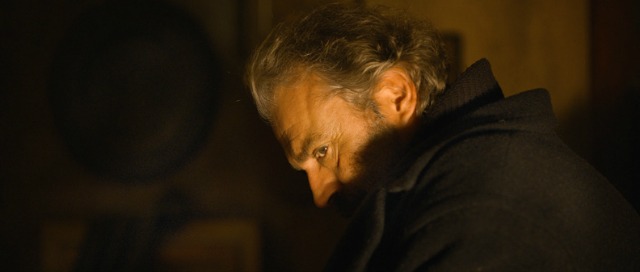Talk Is Long But Not Cheap In 'Winter Sleep'
By Joel Wicklund in Arts & Entertainment on Jan 2, 2015 7:00PM

Haluk Bilginer in "Winter Sleep" (photo © Nuri Bilge Ceylan, courtesy of Adopt Films).
It's no small accomplishment to make a 3-hour, 16-minute movie comprised largely of long conversations compelling, and in that regard Winter Sleep is a real achievement. That said, considering the magnetic opening scenes, it's slightly disappointing when the movie settles in for extended chamber drama dialogue. Many have been positively rapturous in their praise of this Turkish feature (winner of the top prize at last year's Cannes Film Festival), but potential viewers would be well advised to lower their expectations and prepare for something engrossing and worthwhile, but not extraordinary.
Even within the dialogue-heavy sequences, it's clear that writer-director Nuri Bilge Ceylan (Once Upon a Time in Anatolia) has a great eye. His framings are always artful and his slowly gliding camerawork, moving in on his characters, is exceptionally graceful. But his visual approach has a lot more impact in the opening scenes of Winter Sleep, which set up a conflict of mutual class resentment that seems ready to boil over.
In a fine performance, Haluk Bilginer plays Aydin, a former actor now living a privileged life as a landlord and hotel owner. In some countries, Aydin would merely be middle class, but in the geographically striking but impoverished Anatolian village in which he lives, he is very wealthy and powerful man. As Aydin says, "My kingdom is small, but at least I am king."
Though he seems to conduct himself as a gentleman, Aydin is revealed to be an unforgiving landlord who has raised the ire of his poorer tenants with the collection methods of his employees. The resentment is made clear early in the movie, when a rock hits the window of Aydin's truck. The vandal turns out to be a young boy whose father was humiliated by the collectors when his rent was overdue.
That broken window seems to set the stage for the events that will follow, and in a way it does, but Ceylan takes a long detour from the immediate dispute. In conversations with his much younger and unhappy wife, his hopelessly depressed sister, colleagues and guests, Aydin reveals his supreme arrogance and vanity, which hides under the mask of a societal critic with an artistic sensibility.
Anton Chekhov's work was a key influence for Ceylan. That may explain why Winter Sleep, which opens with wide shots of distinctively beautiful but rugged Anatolian landscapes, quickly leaves its most cinematic settings behind for scenes that would seem equally at home in an intimate theater. Conversations that begin as intellectual debates end as very personal arguments, and Aydin's elitism turns into a tragic, self-imposed isolation.
There's a lot to chew on here, but at 3-hours plus, that's a lot of chewing. Winter Sleep is never really dull, but as it becomes clearer that Aydin is hopelessly trapped in his ways, the passive aggressive nature of the dialogue does begin to wear on you. That's probably Ceylan's intention, but it doesn't necessarily justify the epic length.
When the story returns to the saga of the broken window, the film's visual and dramatic vitality returns with it. As the drunken father of the young rock thrower, Nejat Isler also provides a visceral antidote to Aydin's remote, judgmental behavior. His presence is so welcome, you almost want to cheer an inexcusably thoughtless act he commits in the name of his own lost dignity. It's a potent moment in a movie that too often seems to try too strenuously to avoid them. Muted resentment can be quite dramatic and Winter Sleep portrays that state of mind effectively. At its significant length, however, the film might have benefited from burning a little brighter instead of smoldering for so long.
Winter Sleep. Directed by Nuri Bilge Ceylan. Written by Nuri Bilge Ceylan and Ebru Ceylan. 196 mins. In Turkish with English subtitles. No MPAA rating. Opens Friday, Jan. 2 at the Music Box Theatre.